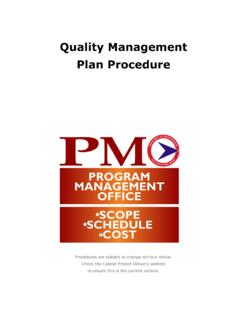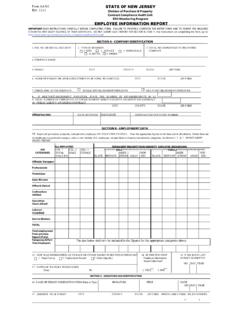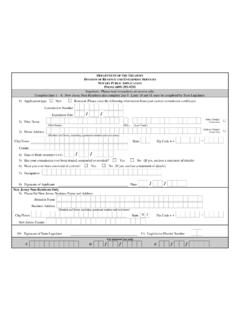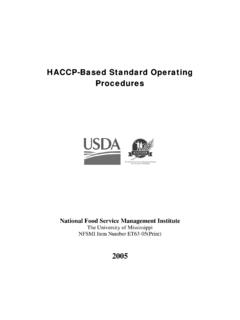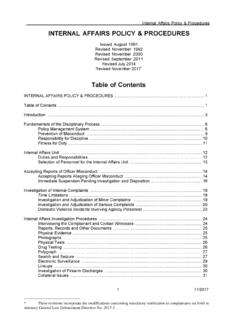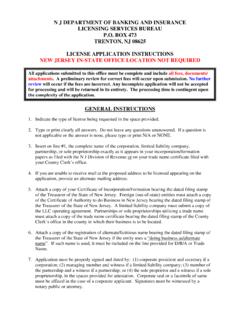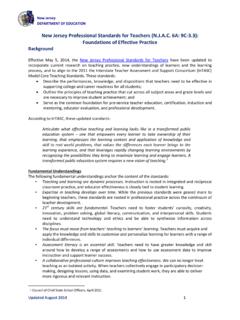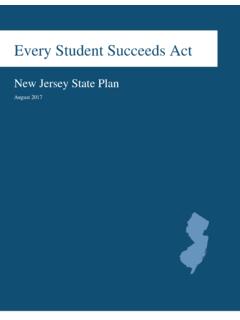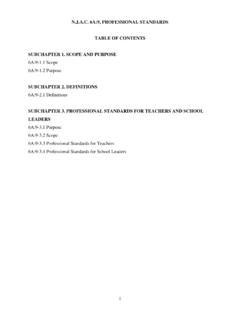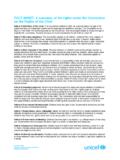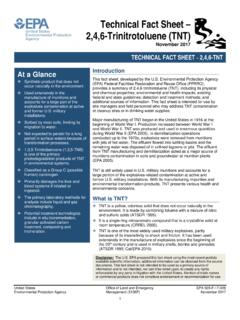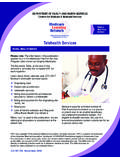Transcription of Alternate benet Program (AbP) - New Jersey
1 Alternate Benefit Program (ABP)Information for: Alternate Benefit ProgramPage 1 December 2017 fact sheet #38 The Alternate Benefit Program (ABP) is a tax-shel-tered, defined contribution retirement Program for higher education faculty and certain administrators. The ABP provides retirement benefits, life insurance, and disability coverage, which when combined with Social Security and other tax-deferred plans can provide security in and adjunct faculty, part-time instructors, officers, visiting professors, and certain profession-al administrative staff required to possess a college degree or its equivalent can participate in the ABP.
2 Full-time is defined by statute to include anyone re-ceiving 50 percent or more of base salary, and may include anyone on sabbatical or paid leave of ab-sence for a period not to exceed one not eligible for membership include: tem-porary employees (with the exception of visiting professors appointed for a school year, a semester, or a lesser period of time); faculty members tempo-rarily in the under an F or J visa; employees in a career service title as defined by the New Jersey Civil Service Commission; employees in clerical and other nonprofessional positions; and any employee receiving a retirement benefit from any New Jersey State-administered retirement system, including the ABP.
3 The following State agencies and institutions of high-er education are covered by the ABP: Atlantic Cape Community College Bergen Community College Brookdale Community College Camden County College County College of Morris Cumberland County College Department of Education (limited positions) Essex County College Higher Education Student Assistance Authority Hudson County Community College Kean University of Mercer County Community College Middlesex County College Montclair State University New Jersey City State University Institute of Technology Ocean County College Passaic County Community College Ramapo College of Raritan Valley Community College Rowan University of Rowan College at Burlington County Rowan College at Gloucester County Rutgers Biomedical Rutgers.
4 The State University Salem Community College Stockton University Sussex County Community College The College of New Jersey Thomas Edison State University Union County College University Hospital Warren County Community College William Paterson University of iNCOMEM embers annually contribute five percent of base or contractual salary matched by an eight percent em-ployer contribution* to a tax-deferred investment ac-count. This account may be established with any of the current authorized providers: AXA Financial (Eq-uitable), MassMutual Retirement Services (formerly * 18A:66-174 established that as of July 1, 2010, the employer contribution may not exceed 8 percent of the maximum salary for State department officers as established by law.)
5 Currently, 52 sets the maximum annual salary of department officers at $141,000 per calendar sheet #38 December 2017 Page 2 Alternate bene t Program (AbP)This fact sheet is a summary and not intended to provide all information. Although every attempt at accuracy is made, it cannot be Hartford), MetLife (formerly Travelers/CitiStreet), Prudential Retirement Services, TIAA, VALIC, and Voya . Additional voluntary federal tax-deferred contribu-tions under Internal Revenue Code (IRC), Section 403(b), may also be made based on the actual base salary paid less the mandatory five percent member contribution.
6 Before having any additional contribu-tions deducted, members should contact the autho-rized carrier of their ABP account for a calculation on the exact amount available to them for a Section 403(b) contribution. These contributions cannot ex-ceed the actual dollar limits eligible for tax-shelter in a given tax year. For most ABP members, mandatory employee and employer contributions are held in a delayed vesting status during the first year of ABP-eligible employ-ment. The member is vested in the ABP beginning in the second year of ABP-eligible ABP members can be immediately vested if the member has an existing retirement account con-taining employee and employer contributions from employment in higher education, or is an active or vested member of a federal or state retirement sys-tem, and transfers that retirement system member-ship to the vested, all contributions and accumulations in the ABP account belong to the member and provide benefits when the member is eligible to receive them.
7 Vested members of the ABP are also eligible to ap-ply, through their provider, for loans made from the member s account balance. Contact the authorized provider for borrowing and repayment : While in delayed vesting status, loans or the transfer of funds between carriers are not permitted. If a member leaves ABP-eligible employment before becoming vested, only the employee contributions, including any investment gain or loss, can be refund-ed. The employer contributions revert back to the em-ployer. The refund of contributions to a non-vested member is considered a withdrawal from the months before retirement, a member should con-tact the employer and the authorized carrier for infor-mation regarding benefits and options.
8 The carriers regularly provide informational seminars on member may elect to receive all or a portion of his/her account in a lump-sum distribution, or as a fixed term or life annuity. Lump-sum cash distributions to members under the age of 55 are limited to the member s contributions and earnings. The remaining employer contributions and earnings are only avail-able after age 55. The types of payout plans vary and should be considered when selecting a carrier. All returns of contributions and earnings are considered taxable in the year they are received.
9 There is no minimum retirement age under the ABP. A member may begin collecting an annuity, or take a cash distribution, at any time after termination of employment; however, if you return to public em-ployment in New Jersey , you cannot participate in any State-administered retirement system. the member will automatically be considered retired, regardless of age, if there is any distribution of mandatory EMPlOyMENt REStRiCtiONSIf you are considering working after retirement, you should be aware of the restrictions imposed by laws and regulations governing post-retirement employ-ment.
10 It is your responsibility to inform your prospec-tive employer that you are receiving retirement ben-efits from a New Jersey public retirement system. As a retiree of the ABP, you are prohibited from enrolling in any New Jersey State-administered retirement system once you have collected a distribution from your tax-deferred investment account. If you want to supplement your retirement income after you retire, employment with a private company, the federal gov-ernment, or another state will not affect your right to receive your retirement are required to completely separate from service before returning to public employment in New Jersey (in a position covered by a different re-tirement system).
